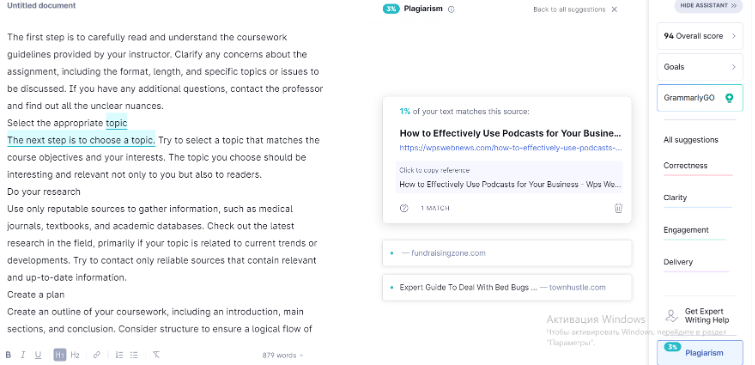Writing a medical term paper requires combining scientific knowledge, research skills, and effective communication. Many medical students receive a difficult task independently and don’t get enough sleep at night. For students who have chosen a medical specialty, writing academic letters is an integral part of their studies because it is essential to gain theoretical and practical knowledge. In this article, we will talk about a few tips that will help you write a successful medical term paper.
Medical Coursework: Writing Guide
The professor often assigns medical students to write a term paper on clinical topics. When faced with an academic task, students often don't know how to do it correctly to get a high score. In this case, the best option would be to ask for coursework help and get an unforgettable cooperation experience with the best service specialists. Experienced experts are ready to handle assignments of any academic level in the shortest possible time. Thanks to professional help, you can save time and do other things while specialists write your papers.
Review course requirements
The first step is to carefully read and understand the coursework guidelines provided by your instructor. Clarify any concerns about the assignment, including the format, length, and specific topics or issues to be discussed. If you have any additional questions, contact the professor and find out all the unclear nuances.
Select the appropriate topic
The next step is to choose a topic. Try to select a topic that matches the course objectives and your interests. The topic you choose should be interesting and relevant not only to you but also to readers.
Do your research
Use only reputable sources to gather information, such as medical journals, textbooks, and academic databases. Check out the latest research in the field, primarily if your topic is related to current trends or developments. Try to contact only reliable sources that contain relevant and up-to-date information.
Create a plan
Create an outline of your coursework, including an introduction, main sections, and conclusion. Consider structure to ensure a logical flow of ideas and stick to a clear structure. Try to move smoothly from one thought to another, and do not write unnecessary information.
Write a strong introduction
Begin your letter with a compelling introduction that provides context and sets the stage for your coursework. The introductory part plays an important role in documents of any type and influences the desire of readers to read your papers to the end. Be sure to formulate your research question or thesis that will be supported throughout.
Support your arguments
Use evidence-based information to support your arguments and claims. Include quotations in your text. Try to quote correctly using one of the citation styles.
Analyse the results
Next, you should present the results of your research in a clear and organised manner. Try to analyse the data and provide critical information on the topic.
Use correct medical terminology
Make sure you use accurate medical terminology and avoid jargon or colloquialisms. Define any specialised terms or concepts that may be unfamiliar to your audience.
Include visual aids
Include relevant tables, figures, and diagrams to illustrate your points, if applicable. Make sure these visuals are properly labelled and cited. Pay attention to detail.
Maintain a formal tone
Write in a formal and academic tone, avoiding personal anecdotes and casual language. Try to remain objective and avoid bias in your analysis. Remember that coursework in medicine is a serious and responsible task that does not tolerate mistakes and jokes.
Review and edit
Check your coursework for grammatical, spelling, and punctuation errors. Check for consistency in formatting and citation style. Ask friends or colleagues to review your document and provide feedback on it. A fresh set of eyes can help identify any shortcomings you might notice.
Bibliography
Create a comprehensive bibliography that includes all the sources you cited in your coursework. Pay attention to the citations' formatting and ensure they match the chosen citation style. Try to contact only trusted sources that contain up-to-date and truthful information.
Plagiarism check
Use plagiarism detection tools to ensure your work is original and properly cited. Successful coursework must be unique and original, so pay attention to reviewing it to avoid difficulties and bad grades in the future.
Seek feedback
After finishing your term paper on medicine, let your friends or colleagues read the papers. This will help you draw attention to parts you might otherwise overlook and easily determine how easy your document is for readers to understand.
Time management
Try to manage your time wisely so that you have enough time to research, write, and revise. Avoid last-minute rush as it can lead to poor quality of work.
Follow the submission rules
Double-check the submission requirements, including deadlines and formatting guidelines, to avoid errors. Be sure to study all the nuances of your assignment before starting the project, and after finishing, read the papers several times and ensure that you did everything correctly.
Remember that writing a medical term paper is a rigorous process that requires diligence and attention to detail. Start early, stay organised, and ask your teachers for help or clarification when necessary. Check the written papers and ensure the text does not contain spelling and grammatical errors.

This article is part of the HealthManagement.org Point-of-View Programme.






















